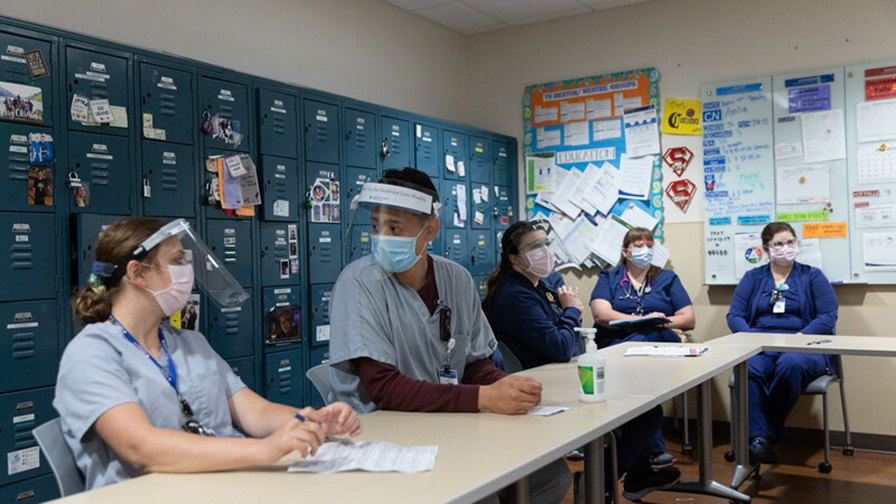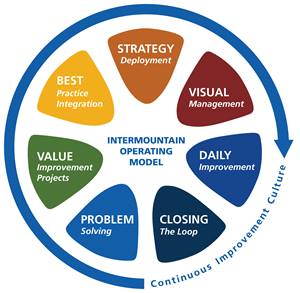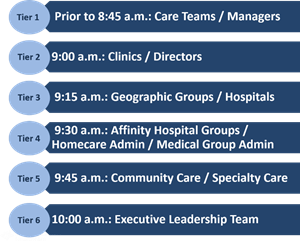

The Intermountain Operating Model has seven key systems.
Intermountain’s daily tiered escalation huddle is a key element in two Intermountain Operating Model systems: Daily Improvement and Closing the Loop. The daily huddle consists of team members getting together (virtually or in person) for 10 to 15 minutes to discuss the important items of the day, shift, or specific time period. Nearly 2,500 huddles take place daily across the organization with teams, units, departments, partners, shared services, support services, functional areas, and local and system structures.
Typical huddles include escalation of any issues related to safety, quality, experience, or patient access that require an action or decision. Escalations can also inform leaders of critical information. Recognition of team members and celebrations of success can also be escalated. Huddle tools include physical huddle boards in facilities and digital huddle boards in the CI Portal. Huddle assignments are tracked in an action register and closed out when follow-up reports are provided to the original owner of the escalation.
Intermountain CEO Marc Harrison, MD, was recently invited to talk about Intermountain’s huddle process for a Grand Rounds discussion with leaders at MassGeneral Hospital in Boston, Massachusetts. He told attendees our huddle process is the foundation of who we are at Intermountain. Daily huddles ensure our practices are aligned systemwide across our geographic footprint and focus each team’s work around our mission and fundamentals, from the frontlines to executive leadership. As One Intermountain, “we solve problems in real time” Marc said.

CEO Marc Harrison, MD
The need to act quickly, adapt in the face of uncertainty, and break down silos has been made clear during the pandemic, Marc said. He added that a key takeaway from the past year is the value our daily huddles provide in meeting patient needs in the current environment.
“I’m impressed by how quickly a big organization can pivot when needs are made transparent and when those needs are largely oriented around caregivers and patients,” Marc said. “One of the best examples is how quickly we’ve incorporated the best evidence we have around how to take care of COVID patients in our daily practice. Historically, it’s taken more than a decade for an evidence-based therapy to be incorporated into change and practice across the industry. We now know that we can do it in weeks or months.”
Intermountain’s huddle process also shows we’re all accountable for Intermountain’s success. Daily huddles are built on the wisdom of caregivers working within the areas they know best. You’re encouraged to share your voice and creative solutions with your team and leaders. The new monthly KPI performance dashboards, which are tied to our annual caregiver incentive payment, are a resource to help you learn more about Intermountain’s systemwide areas of focus and to begin a conversation about where your teams can drive meaningful change. There are areas where we each can get involved to further Intermountain’s mission and improve our delivery of care.

Intermountain’s daily escalation huddle schedule.
Marc says caregivers’ engagement in the huddle process and our culture of continuous improvement is crucial to meeting the evolving needs of our patients. “I think the tiered huddle process, and the Intermountain Operating Model that it serves, is a really powerful tool for doing the right thing for other human beings,” Marc said. “It becomes unconscionable not to serve others in that way once you know you can do it, and I hope that’s one of the things that never changes after the pandemic.”
Daily tiered escalation huddle accountabilities:
- Caregivers should participate in huddles to engage in team-based process improvement, share ideas, escalate concerns, and recognize team members.
- Managers are asked to lead effective daily team huddles, enter relevant huddle data in the daily tier escalation huddle tool in the CI portal, manage escalations appropriate for their tier, and escalate concerns to senior leaders.
- Senior leaders are asked to lead daily tiered escalation huddle, remove barriers for their team, ensure follow up on escalated issues, and recognized teams and individual caregivers.
Watch a short video that gives examples of a daily huddle.

